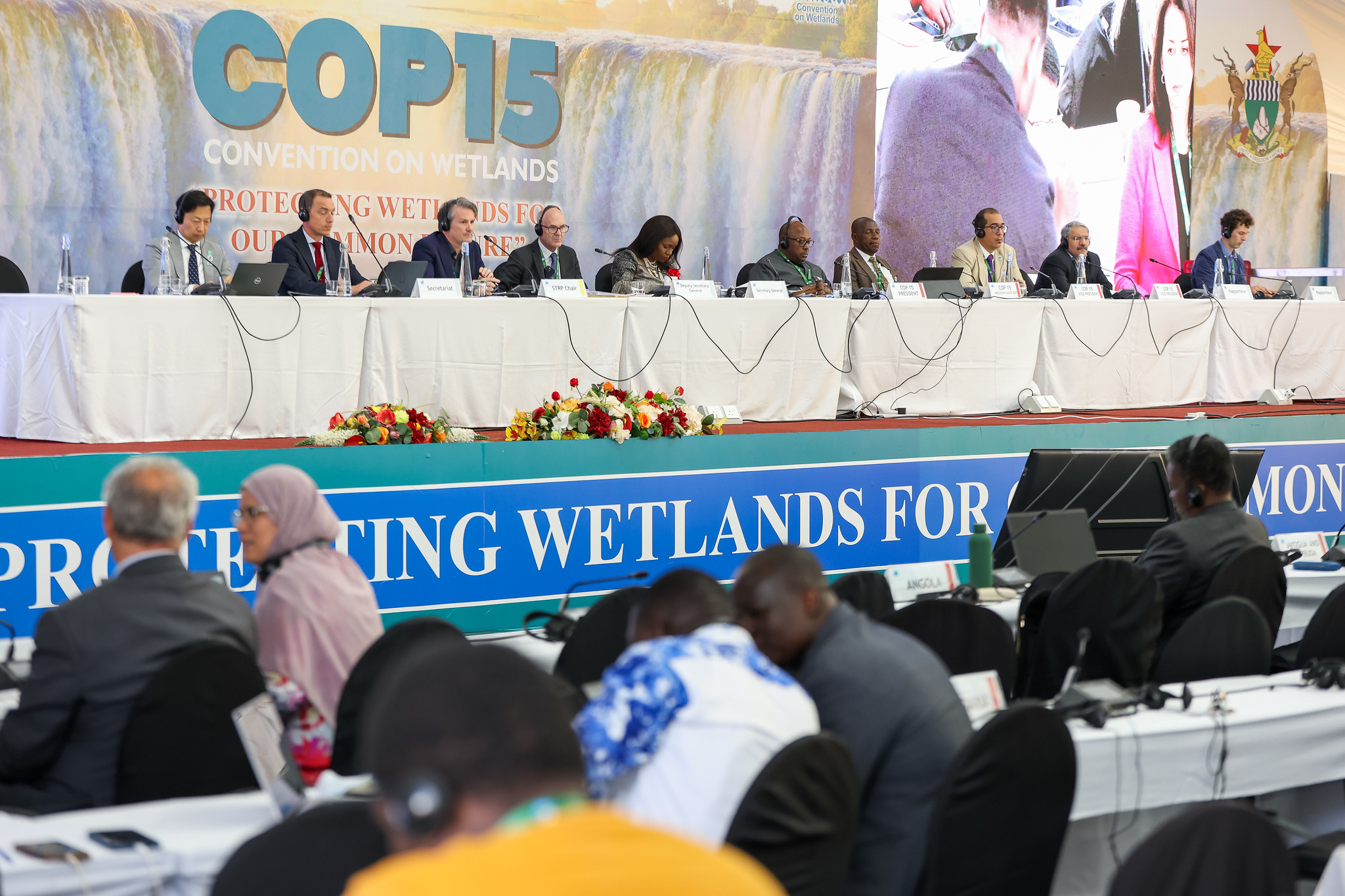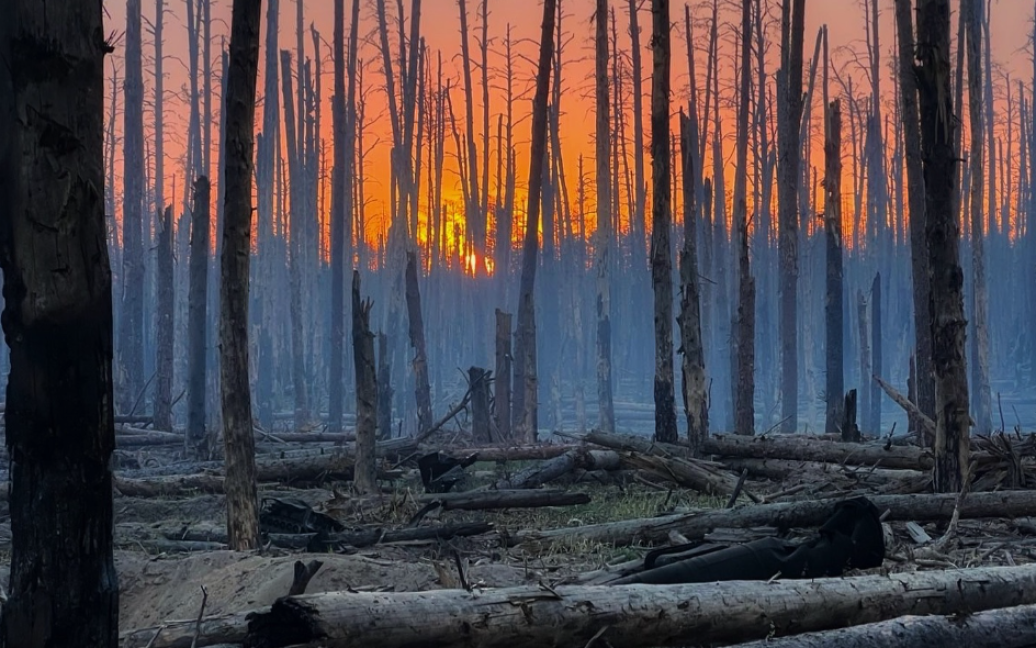Eugene Simonov, Angelina Davydova
In denouncing the Ramsar Convention Russia expressed its disagreement with the allegedly “anti-Russian position” of the convention’s parties. Subsequently, Russian president Vladimir Putin decreed that the convention’s goals be implemented (outside of it) using domestic policy measures and bilateral agreements. UWEC spoke with international experts to understand the framework within which the convention’s mechanism could succeed despite the intensifying international confrontation.
The reason for Russia’s denunciation of the convention was a rather harsh resolution condemning Russia’s invasion of Ukraine adopted at a conference of the Parties back in November 2022, as well as the convention secretariat’s consistent implementation of the resolution’s provisions for assessing the impact of Russian aggression on Ukraine’s wetlands. As experts point out, the resolution did not directly restrict Russia’s rights as a member state, but its text called on the parties not to nominate Russia for leadership positions and awards, “provided that such decisions do not affect the best interests of conservation and protection of wetlands”.
Nevertheless, Russia expressed its political “resentment” at this statement in a highly counterproductive manner, withdrawing from the convention and thereby abandoning international measures to protect some 10 million hectares of valuable natural areas. Experts from UWEC and dozens of other media outlets have analyzed in detail the consequences of this move in relation to international environmental obligations.
Read more: Russia exits Ramsar Convention on Wetlands
It should be noted that disputes over whether the wetlands convention has the authority to adopt an anti-war resolution have been ongoing since at least 2022. This raises further questions: if it has the authority, then within what framework, and if not, what international mechanism should protect wetlands from military action?
Tatyana Minaeva, a leading expert in protecting wetlands of international importance and scientific director of the German environmental organization Care for Ecosystems, explained to UWEC that international practices do not normally use specialized environmental conventions to solve non-core political issues:
“Russia’s denunciation of a number of conventions became possible because of decisions related to the war that exceeded the scope of established practices. This is linked to declining diplomacy in general and professionalism within the secretariats of the conventions in particular. Undoubtedly, conventions adopt resolutions on both specific issues and cross-cutting issues relating to sustainable development (i.e., universal principles of international law enshrined in UN declarations and conventions, for example, as summarized in the UN Global Compact). Nevertheless, legal enforcement related to “cross-cutting principles” occurs in the context of the convention’s specialization.”
Minaeva continues, noting that the Ramsar Convention on Wetlands does not have the authority to adopt resolutions on women’s rights or the inadmissibility of military aggression. “However, this convention can monitor countries to ensure that the rights of Indigenous peoples and women are not infringed upon in the course of activities to preserve wetland landscapes, and that other UN principles are observed as well. The convention can also adopt a resolution on what to do if territories recognized as internationally significant under the convention find themselves in a war zone, occupied territory, or other crisis situations. In fact, a truly urgent resolution for the management of Ramsar sites in conditions of military action would be to include them in a special list of threatened sites under the convention (the so-called Montreux list) without an official request from countries, a step that is currently required.
“Ideally, international legislation on military operations should include provisions stating that the destruction of cultural and natural heritage during war constitutes a “crime against humanity.” In general, the legal framework of so-called “soft” law, which includes multilateral international agreements on nature and environmental protection, does not provide for a country that violates other international law to lose its legitimacy in a specific convention on special environmental issues, whether we like it or not. Thus, the use of environmental conventions as a means of leverage can be classified more as “moral” pressure.
Meng Wang, a researcher at Maastricht University, has a similar view on the issue. In her article on the Ramsar Convention’s attempt to respond to Russian military aggression, she argues that the Ramsar Convention has generally been successful and adequate in stepping up international efforts to protect wetlands during the war. Nevertheless, the convention has not created sufficient mechanisms for cooperation in the course of a conflict:
“Given the complex geopolitical situation and the importance of these wetlands, dialogue and cooperation are crucial between the parties involved—namely Russia, Ukraine, and the Ramsar Secretariat. Such dialogue is essential for collecting accurate and up-to-date information regarding the ecological status of these occupied Ramsar Sites. However, the Resolution, as it stands, does not provide specific, substantive measures to facilitate such cooperation. In essence, the Resolution falls short of offering strategies to encourage cooperation to address the complex situation of Ramsar Sites under occupation.”
According to international law, the “occupier” is responsible for ensuring the protection of any valuable assets in occupied territories. However, in practice, it is extremely difficult to verify that protection is actually provided in such paradigms. “Environmental cooperation” between the aggressor state and its victim is even less likely, even with the mediation of convention secretariats.
In the case of territorial disputes, and even more so in the event of wars, the international designation of valuable natural areas can be used by countries not only to protect nature, but also to assert their rights to disputed lands. For example, Russia regularly submits data concerning protected areas on Ukrainian territory that it occupies to international monitoring centers on its own behalf. These centers then enter the information received from the Russian Federation into international databases.
This issue concerns many member countries of the Ramsar Convention, when, as a result of wars, historical disputes, and other circumstances, some Ramsar wetlands of international importance have been designated by participating countries in territories that their neighbors consider to be their own. However, there are so many protracted and heated conflicts around the world that attempts to resolve this issue under the convention have not yet been successful.

During the 14th and 15th Conferences of the Contracting Parties of the Ramsar Convention, the Algerian delegation attempted to pass a resolution stating that official UN maps should be used to verify the nationality of nominated sites, which, according to the resolution’s authors, would exclude their nomination in disputed territories. Five rounds of discussions revealed numerous conflicting opinions, but many delegates expressed concern that such an approach would “open a Pandora’s box” and turn the convention into a platform for territorial disputes that would hinder the work of protecting wetlands.
As a result, the final report for COP-15 included a note from the convention secretariat’s legal advisor explaining that the Secretariat maintains the list of wetlands as declared by countries, and is not authorized to decide not to include proposed wetland sites and even less so to discuss issues of countries’ sovereignty over specific territories or to interfere in territorial disputes. In the end, the resolution was not adopted, and the issue of boundaries was referred to the Standing Committee of the Convention for consideration at future meetings, effectively removing it from the current agenda. Apparently, most countries do not want to allow specialized environmental conventions to be used to achieve other political goals, even when those goals are good and legitimate from the point of view of other areas of international law.
It is in this context that it becomes clearer why, in 2025, 79 of the 136 COP-15 participants either abstained or did not participate in the vote on the resolution in defense of Ukraine’s occupied Ramsar wetlands.
The crisis we are witnessing shows that, in a conflict situation, the prospects for using international environmental agreements to preserve valuable natural areas captured during the war are likely to be very limited. During discussions on this topic at Ramsar COP 14 and COP 15, some countries proposed using international mechanisms focused on crisis management, such as international humanitarian law, rather than the Ramsar Convention.
Read more: Ramsar wetlands under fire in Ukraine
Overall, however, Russia’s high-profile withdrawal from the convention caused confusion in the international community and prompted negative reactions in the press. Russian wetlands are of enormous global importance, both for the protection of migratory birds and for carbon storage in peatlands, the latter of which cover more than 10% of the country’s territory. As a result, Russia’s denunciation of the convention is contrary to the interests of many countries.
In an attempt to mitigate reputational damage, on August 28 President Vladimir Putin issued a series of instructions regarding further actions related to wetlands management in the Russian Federation. In particular, the Russian government was instructed to:
🔸Ensure international cooperation for the protection of waterfowl “entering the territory of Russia” by signing (or renewal) of relevant bilateral agreements,
🔸Create a system for tracking arriving waterfowl in the Russian Federation and their abundance (by species and population), as well as their resting and nesting sites (the decree does not mention birds leaving the Russian Federation).
🔸Ensure that an inventory of wetlands is carried out and that their conservation regimes are clarified,
🔹The Russian Foreign Ministry has been instructed to inform the parties to the Convention of the reasons for its denunciation and “on ensuring that its objectives are fulfilled in Russia as per the national law” in accordance with domestic legislation (it is unclear whether the Russian Foreign Ministry is capable of conveying the meaning of what is happening to the 171 signatory countries to the Convention).
Russian environmentalists are not yet ready to give a definitive assessment of the consequences of these instructions. On the one hand, these steps appear to be a rejection of international environmental standards, while on the other, they could result in Russia’s first national legislation for the conservation of wetlands. In addition, the head of state has completely “rehabilitated” migratory birds, previously mentioned by the authorities mainly as biological weapons wielded by Ukraine and NATO.
Apparently, this is Russia’s new algorithm for reforming international obligations in the course of its aggression: withdrawal from international conventions, coupled with a promise to take unilateral measures to “ensure the achievement of the objectives of these conventions in the Russian Federation” and the establishment of bilateral cooperation with “friendly” countries. This is an aggressive and isolationist approach, but in its own way logical, for a country that does not want to stop its aggression, let alone bear international responsibility for it.
Given this imperial imperative, these instructions may be beneficial for protecting Ramsar sites within Russia, provided, of course, that the government implements them. However, statements by Russian diplomats indicate that Russia also considers the 15 occupied Ramsar wetlands in Ukraine to be “its own.” Another likely reason for withdrawing from the convention is Russia’s unwillingness to get involved in a public dispute about state jurisdiction over these territories within the context of the convention.
The global community must carefully consider these events and begin developing joint solutions for protecting wetlands in an atmosphere of war and global confrontation. How can the international community counter this proposed algorithm for “Russian sovereign wetlands” that uses avenues for the preservation and maintenance of international mechanisms for nature conservation? In a future publication, UWEC will present an overview of precedents for withdrawing from international environmental agreements during wartime.
Translated by Jennifer Castner
Main image source: Ramsar Convention Secretariat







